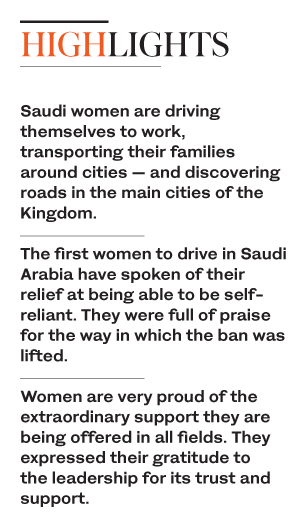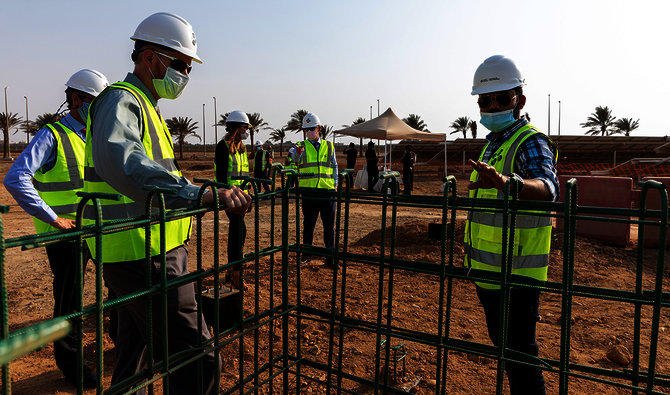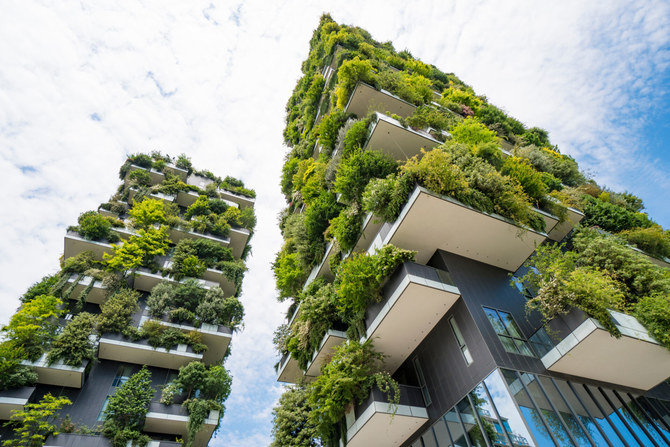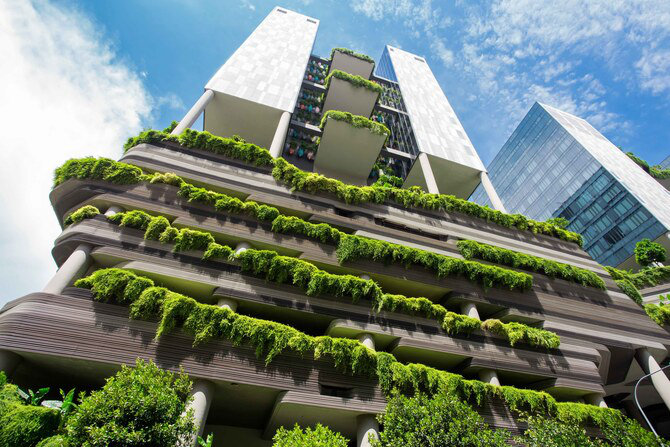JEDDAH: Nearly 100 days after women began to drive in Saudi Arabia, Arab News asked new motorists in major cities of the Kingdom for their experiences since the historic lifting of the ban.
The first women to drive in Saudi Arabia have spoken of their relief at being able to be self-reliant. They were full of praise for the way in which the ban was lifted, singling out new traffic laws for creating a safe environment. They referenced the anti-harassment law that accompanied the lifting of the ban, crediting it with creating a safe atmosphere for the wave of new women drivers.
Saudi women are driving themselves to work, transporting their families around cities — and discovering roads in the main cities of the Kingdom are full of courteous male drivers. One even spoke of the humility of male drivers.
 Not all the experiences were immediately positive. One woman reported a man who tried to crash into her vehicle to the traffic police who quickly arrested him. But even this experience gave her confidence that she would be able to drive safely.
Not all the experiences were immediately positive. One woman reported a man who tried to crash into her vehicle to the traffic police who quickly arrested him. But even this experience gave her confidence that she would be able to drive safely.
“No male driver has irritated me on the road. They are all cooperative and supportive,” said one.
Dr. Sharifa Al-Rajhi, a professor of statistics at King Abdul Aziz University in Jeddah, has no hesitation in describing what the move means — for her, driving means freedom.
“We had some social obstacles that have long prevented women from driving, despite the fact that Saudi women have achieved great jobs on all levels. To me, driving means that you feel independent,” she said.
She began learning to drive in Florida when she was studying for her higher education programs. Returning to Saudi Arabia, she was “shocked” as she had to have a driver to take her everywhere.
“I had to take my driver’s wishes into consideration otherwise he would refuse to work. He got angry many times and asked to leave. I even beseeched a driver to stay as I needed his services. I have never begged a person like that,” Al-Rajhi said. It was a struggle for her to learn to drive, as her husband tried to give her lessons but it was not a success.
“I do not recommend a woman asks her husband, brother or even relative to teach her how to drive. A relative would easily get stressed over your mistakes, and this will have a negative impact on the trainee. She should seek the assistance of a professional instructor,” she said.
In frustration, she joined a driving school and started lessons with a male instructor in his sixties. “He kept encouraging me until he succeeded... (he managed) to break down my fear in just two hours,” she added.
She was then aged 26 she said that she mastered the basics of driving in a further two hours.
“The most important thing is to overcome fear, and everything else will go smoothly. I did not pass the test the first time due to being a bit reckless, but I made it at the second attempt,” she said.
She expressed gratitude for the royal decree allowing women to drive in Saudi Arabia and noted that the anti-harassment law that accompanied the lifting of the ban meant there was a good atmosphere for women drivers.
“Truly speaking, no male driver has so far irritated or annoyed me on the road. They are all cooperative and supportive. I remember a security man at a checkpoint in the north of Jeddah stopped me and asked for the license and the vehicle’s registration card. I showed them to him. He smiled and said: ‘You are a heroine. You can now go,’” she added.
Wassal Al-Dosari, from Dammam, described the day the ban was lifted. “On the morning of Sunday, June 24, I drove to work and back home. For the first time in my life, I did all my work myself without being harassed or annoyed,” she said.
She was surprised by what she found — all the male drivers she passed were helpful and encouraging.
“The new traffic laws have contributed to making our first driving experience in our country not only safe but also enjoyable. With these regulations, men drivers have obviously become more attentive, cautious and have shown humble driving behavior,” she said.
She added that the decision to lift the ban on women driving came at the right time, paving the way for women to drive in a secure atmosphere. “I extend my thanks to the Custodian of the Two Holy Mosques and the Crown Prince for making Saudi women’s dreams come true.”
Another driver, based in the eastern region, said her father had insisted she join a driving school to learn to drive.
“I was sent to Florida in 2012. When I arrived there, my father insisted that I enroll in a car-driving course. I completed the training hours and succeeded in the first test,” said Dai Al-Eidi, a US university business administration and marketing graduate. She got her license in 2012 and had five years’ driving experience abroad. She learned of the lifting of the ban before returning to the Kingdom.
“I was delighted with the news when I was abroad. I returned to Saudi Arabia and was offered several jobs. I got a job as a driving instructor,” she said.
 Before taking up the job, she was asked why she wanted to become an instructor. “My answer was because driving a car in my country has always been a dream that has recently been made a reality.”
Before taking up the job, she was asked why she wanted to become an instructor. “My answer was because driving a car in my country has always been a dream that has recently been made a reality.”
She added that she is very proud of the extraordinary support Saudi women are being offered in all fields. She also expressed her gratitude for the leadership for its trust and support.
“We women are all enthusiastic to make our precious country the best,” she added.
Likewise, Ghadeer Tayseer Al-Senan, another female driver from the Eastern Province, spoke of the relief at being able to drive your own car when you want, anywhere you want, without having to worry about how you will get there.
“When King Salman granted women the right to drive, it was an indescribable moment for us as Saudi women because finally a woman can rely on herself to secure her needs,” Al-Senan said. She added that she started driving eight years ago when she was living in the US, where she had her own car.
“I was independent for my rides when I was in the States, and I now know how it feels to have your own car to travel around and do your own rides. My father used to give me lifts, but he got tired of it after many years,” she said.
She has also noticed that male drivers show great respect to female drivers. “The decision is new and it was welcomed by men and women alike. This is quite clear from the female motorists’ joyfulness and the men’s respectful driving behaviors,” she said.
For Alkhobar driver Reham Al-Shamrani, there was some trepidation at first.
“There was certainly some hesitation and fear and I was wondering if the Saudi street would accept seeing a girl driving. Some eight hours after the decision became effective I picked my sister’s children up on a ride to the nearby supermarket to buy them ice cream,” she recalled.
She said a male driver next to her at a traffic signal looked at her in awe. “Even when the green arrow of the traffic light appeared, he kept stopping where he was for a while. It was an experience I will never forget.” she added.
Similarly, Sarah Al-Sakran, from Riyadh, said at the beginning she found it strange, especially as she was one of the first female drivers to get behind the wheel.
“It was awkward on the street. I had difficulties, so I got annoyed first, but things went well later. No annoyance, no harassment,” she said.































